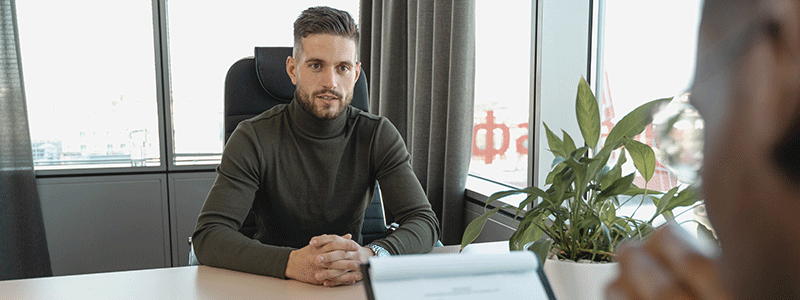We all know that no two interviews are the same, but what we do know is there are a set of staple interview questions that you can bet your life will be asked during any interview, no matter the role. Most of these are open questions that aim to test you – interview questions that don’t necessarily have a right answer, but definitely have wrong ones!
Preparing answers for these types of interview questions, sets you up for success. If you have the industry knowledge and required experience of the role, you’ll be able to answer any questions relating to this. However, it’ll be lack of preparation for the open questions that could trip you up.

As experts in the recruitment industry (modest), we can honestly say, we’ve probably heard them all! We have collated a list from our interview reviews to find the most commonly used questions. Here are 20 of them, and we’ve given you a little help as to how you can create a great answer.
Get you notepad ready and start making notes.
Can you name some of your strengths?
This is one to definitely expect, but don’t come back with “I can bench 210”. This is your chance to sell yourself and let them know why they should choose you. Avoid generic answers, be specific to yourself and the role you are interviewing for.
What are your weaknesses?
This comes hand in hand with the strengths question. Many people think the best way to answer this is to hide a positive in a weakness: “If anything I try too hard!” This won’t be what the interviewer wants to hear. This is your chance to show you’re self-aware and always looking for improvement. Don’t go over the top and ruin your chances, simply identify a genuine weakness and show that you’re actively overcoming it.
Why do you want to work here?
This is where a little research comes in, it’s your opportunity to showcase that you have studied the company and what it stands for, and you think their values align with yours.
Why should we choose you? What can you offer us?
Imagine if you’d not prepared an answer for this one! So, get preparing a great answer – and not a generic one. “I’m a hard worker and I really want this role” will not cut it, because every other candidate will be thinking the same, and your interviewers will expect this as a given. Think about what skills/experiences you possess that puts you ahead of your competitors.

Where do you see yourself in five years? Ten years?
“I’ll be running this place!” Being ambitious is welcomed but be realistic and not sarcastic. The interviewers will want to know you have aspirations of going places within their organisation, but expectations of grandeur will count against you.
Why did you leave your previous role?
Even if your last job was the WORST – do not be overly negative! Focus your answer on the future – new location, new challenge, better opportunities for growth.
Would you be willing to travel if needed?
You should already have an idea of the travel involved/expected for the role you are applying for. Don’t just blindly say “YES” to get the job. If they’re expecting you to travel long distances or stay overnights, and you don’t really want to – this might not be the job for you – don’t waste your/their time.
Describe an accomplishment you are proud of
If you haven’t prepared an answer for this one, it can be a problem. Don’t sit umming and ahhing, struggling to think of something. Have your story ready – sell your achievements – this is an answer that could secure you the role.
Describe a situation when you made a mistake
Everybody makes mistakes, do not say “Ahhh, I don’t remember making one”. They will not think, “Wow, this guy never makes mistakes!” Recall a time when you made a genuine error and focus on exactly what you did to rectify it.
Breakdown your CV for us
This can be a tough one, as your CV is probably two pages long chocked full of information. One thing is for sure, the interviewer doesn’t want you to go through it all, as they’ll have already done that themselves. You need to pick out the main highlights and take this opportunity to explain anything that might need more info e.g. Why there is a gap in your work history, or the reason behind a short time in a certain role.
Tell us a little about your educational background
“I got a C in English, B in Maths, D is Geography……” Stop! Thanks to your CV, they probably already know this. You need to focus on how your qualifications and skills will help you in the role you’re interviewing for. Sell yourself, this can sway them into thinking you are perfect for the job, and you are what their company needs.
Why should we give you the job?
The interviewer will know you a little by now and have seen you have the skills to do the job in question – as will all the candidates. This is a chance to reference a specialist skill or a certain experience that you have that you think the other candidates won’t possess.
Who do you think are our company’s competitors?
This is another research question, if you haven’t bothered to Google it’s competitors and they ask you this, it will be a problem.
Tell us a little about your leadership experience
You may not have management experience – don’t worry – you don’t need this to have shown leadership experience. Try to think of a time where you worked as part of a team and took a leadership role.
How do you cope working under pressure?
Some people thrive under pressure and others struggle, most of the time you’ll know how much pressure to expect in a role. Don’t just say “I love a bit of pressure!” Instead, discuss previous situations where you have worked under pressure and still got the job done.
What do you dislike most about working in this industry?
Don’t be fooled into thinking your interviewer wants to hear you moan about customers or clients. You need to prepare an answer that highlights a peeve but how you use that to bolster your performance.
Tell us a little bit about yourself
“I like to see my friends at the weekend and have a few!” NO…. “I’m all about work, I don’t really do much else” NO! The interview process is a lot about your skills, knowledge and if you are a fit for the role. However, it’s also integral that your personality fits into their team. Give them a little information about you; hobbies, family, likes and dislikes. Avoid stories about alcohol, ex-husbands, and anything illegal!
What was the last book you read?
This is one of those curveball interview questions, that you wouldn’t be expecting (you will now!) If you have just finished 50 Shades, maybe refrain from sharing that one. Instead, think of something that may be relevant to the role you’re interviewing for – even if it’s a bit of a stretch. Do not lie, if you’ve not actually read it – if the interviewer has, that will be embarrassing for you.
What is your favourite website?
Be sensible, and don’t say the company’s website is your favourite (unless it really is) in an effort to flatter them. This question is actually one about your personality. It gives the interviewer an insight into your interests outside work, whether that be news, current affairs, social media etc.
Are there any questions you would like to ask me?
You will 100% be asked this question, so make sure you prepare a few, just in case they get answered during the interview. You wouldn’t want to ask something that the interviewer has already covered. The serious elements should have already been covered, so it’s good to ask questions about the team and the role e.g. How big is the team I’d be working in? This will likely be the last question asked, so leave the interviewer thinking that you really want the role and would fit well into the team.